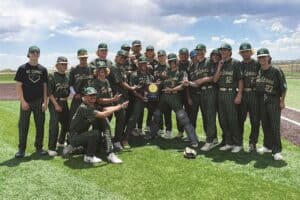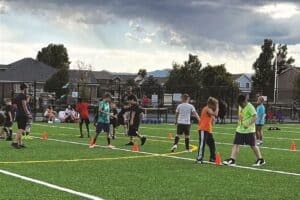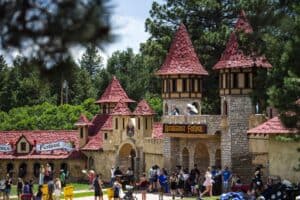Damaging hail and late spring and early fall frosts often make vegetable gardening in Falcon an act of courage.Peyton resident Tracy Bookman and his family used to farm in Falcon, growing specialty greens on his farm, Arise & Shine Acres on Falcon Meadow Boulevard.”On harvest day, our customers would come right to our house and pick up that day’s harvest,” Bookman said. “Dr. Scott Miller, who used to be a chiropractor out there, would let us sell our produce in his office, and we would sell out in just a few minutes.”Things were going great until 6 inches of snow arrived one year in September and buried all of their lettuce, he said.”I love farming, and there’s a lot of potential for it here. We’ve entertained the idea of doing it again, but if you’ve got crops that are delicate, you’ve got to have them under hoop houses,” Bookman said.Jalapeno peppers do extremely well in this area, as well as potatoes, he said.As for pocket gophers, another bane for Falcon gardeners, Bookman said he didn’t mind them too much because they do a good job of aerating the soil, but they did show an extreme fondness for his pepper plants.For controlling burrowers, he suggested outdoor cats. “They do an extremely effective job.”Bookman said he’s also considered stacking old tires, filling them with dirt, planting tomatoes in them and topping the tomatoes with a plastic shelter known as a “Wall of Water.”While not aesthetically pleasing, the tires will collect heat from the sun during the day, extending the tomatoes’ growing season, he said.This year, Marc Short and his wife, Cathy, who have been feeding their family from a vegetable garden behind their Falcon home on Meridian Road for the past 20 years, plan to expand.They’ve named their farm the Double M.Last year, the Shorts’ garden was a third of an acre and provided enough produce for the family to eat and for Marc Short to sell at the farmers market in Fountain.This year, the Shorts plan to triple the size of their garden and sell shares to the public.Selling shares in a family garden is not a new idea, Marc Short said. It’s called community supported agriculture, and it got started in the late 1980s as a way for consumers to buy local, seasonal food directly from a farmer.With the economic downturn, it’s a way to eat high quality, fresh vegetables for less money, he said.In return for paying a $600 share, each week during the growing season the Shorts’ shareholders will receive a box, about a bushel and a half, containing enough vegetables to feed a family of four for a week, he said, adding that they might consider selling half shares for a family of two.At the beginning of the season, the boxes will be less than full, but as the growing season progresses, the boxes will be more than full, Short said.Unlike most CSA operations, shareholders will not be required to work in the garden, he said.”We’re planning to grow a lot of things we’ve grown before and a lot of things that are new,” Cathy Short said.They already have $1,000 worth of seeds, including 45 heritage varieties from the Seed Savers Exchange, such as Dragon carrots, October beans, Romanesco broccoli, Minnesota midget melons, Bulls Blood beets and Long Island Brussels sprouts.The Shorts also have seeds for seven varieties of tomato; herbs such as chives, cumin, lavender, oregano, rosemary, sage, tarragon, basil, cilantro, dill, parsley, thyme and tomatillos; which did especially well last year.The Shorts have purchased two 55-feet-long hoop houses to extend Falcon’s short growing season, where the last frost is usually around May 20 and the first frost is Sept. 15, Marc Short said.”The hoop houses will add 30 days to each end of the growing season,” he said. “We can start seeds indoors, transfer them to the hoop houses and have produce ready to distribute by June 1.”While not officially organic farmers, the Shorts use natural techniques and avoid using chemicals as much as possible. He’s placed bird houses throughout his property to encourage birds – downy woodpeckers and flickers – to nest and eat all the insects they can find.Fertilizers include horse and chicken manure plus wood ash from the Shorts’ wood burning stove, which they use to heat their house, Marc Short said.Regarding the gophers, Marc Short said running the tractor near the garden seems to keep them away.Vegetable gardening runs in the Shorts’ blood.Marc Short is from Virginia, where his father ranched and the family’s vegetable garden kept their stomachs full. Cathy Short’s family comes from Kansas, where they ran a big farm; her stepfather was a county extension agent for Colorado State University.If things go well with the garden this year, the Shorts have room to expand, but any future expansion will be done cautiously.”I need to be sure of living up to the responsibility,” Marc Short said. “Growth has to be done in a responsible way.”







